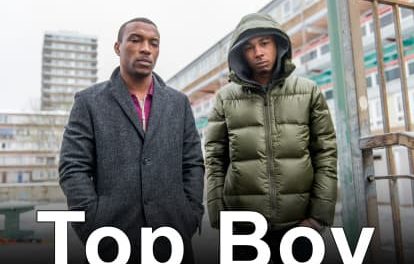In my first ever blog for ECREA/CST, I talked about how Succession (HBO/Sky, 2017-2023), then having aired three series, engaged with Classical history and myth/legends. As Succession has now ended, there are a number of issues relating to how the series uses religion and history and how both of these elements engage with the series’ romantic aspects. To that end, this is the first of three linked blogs – a succession of Succession blogs – which explore these topics. Here, I am looking specifically at how the series engages with Christianity through analogy.
I have given a precis in my first blog for anyone unfamiliar with the series. This blog will primarily focus upon the character of Tom Wambsgans (Matthew Macfadyen), who marries into the Roy family and its corporate empire, Waystar, through patriarch/CEO Logan Roy’s (Brian Cox) daughter Shiv (Sarah Snook). Tom subsequently falls in love with his assistant (and Shiv’s cousin) Greg Hirsch (Nicholas Braun) who is from the minor branch of the family. Greg seems to reciprocate Tom’s feelings, though it is never explicitly stated; Greg does clearly care about Tom, however, and by series four they have an established homosocial peer relationship as friends. Logan (spoiler, sorry) dies in 4.3 and, after a complicated series of events, in 4.10 (spoiler again, sorry) Tom becomes CEO. In the midst of an emotional breakdown due to stress and pain (3.4), Tom tells Greg ‘I would castrate you and marry you in a heartbeat,’ as a way of (inadvertently) expressing his love and attraction through analogising them to the Roman Emperor Nero and Nero’s castrated, enslaved lover Sporus who Tom (erroneously) believes ‘replaced’ Nero’s wife. This coding of queer love as Neronic (albeit couched in terms of toxic masculinity, the historical Nero engaging in domination and submission aside, Beattie, 2023) remains relevant into series four. It is simultaneously relevant to the references to Christianity, as Christianity begins during the reign of the Iulio-Claudians, of which Nero was the last bloodline emperor.
Early Christianity features martyrs sacrificing themselves as a way to show their faith and, arguably, in emulation of Jesus with all of the connotations of dying for the sins of others, expiation of sin and a promised reward after death. The concept has since expanded to encompass self-sacrifice more generally, but it is seen repeatedly in the series particularly associated with Tom., Both aspects of the character (Nero and Jesus/martyr) are omnipresent throughout the series, with Tom repeatedly sacrificing his needs for Shiv’s plans and/or Greg’s protection, offering to go to gaol for everyone (Greg included) in series three, plus his suffering distress (over Greg’s interest in a woman and over being called ‘full of grace’) in the ‘compliments garden,’ analogous to Jesus’ suffering in the garden of Gethsemane, in 3.7. Each aspect also functions in regard to how Succession positions queer masculinities, especially in the context of corporate culture.
It may seem counter-intuitive to argue that a diegetically self-described Nero-analogue is also a Christ-analogue. Yet both Nero and Jesus were a mix of human and divine in many traditions,[1] and the historical analogies the characters use within the diegesis are often inaccurate (Beattie, 2023). Isherwood (2015) and Bohache (2003) also both argue for a queer theology which can accommodate a queer Jesus. Thus the double analogy (Nero/Christ) represents the negotiations required of queer men in the workplace, particularly with regard to relationships. Christianity is strongly connected to toxic/hegemonic masculinity (Gray, 2021). Three of the main Biblical passages which convey explicit homophobia are in Paul’s epistles (Romans, 1:26-27; 1 Timothy, 1:9-10, and 1 Corinthians, 6:9-10);[2] 1 Corinthians, 6:9-10 connects the idea of ‘softness’ (malakoi) which is then generally linked to weakness and can connect to the idea of being penetrated during sexual intercourse between two men.[3] The fallacious association between women and weakness and between same-gender relationships between men and weakness were present throughout Classical Greece and Rome and contemporary Western perspectives of gender and orientation seem to derive from it, often via Christianity (Gray, 2021).
Through this, I would argue for Succession’s use of and connection between religion and toxic/hegemonic masculinities. The series illustrates both toxic and dominant-hegemonic masculinities, primarily exemplified by Logan as its autocrat/patriarch and then later by Logan’s son Kendall (Jeremy Strong) who believes he is the front-runner to succeed Logan and Lukas Matsson (Alexander Skarsgård) who is in the process of purchasing Waystar when Logan dies. Sculos defines toxic masculinity as a ‘loosely interrelated collection of norms, beliefs, and behaviours associated with masculinity, which are harmful to women, men, children, and society more broadly’ (2017: n.p.) which includes ‘rigid conceptions of sexual/gender identity and roles, heteronormativity’ (2017: n.p.). Hegemonic masculinities are a hierarchy of masculinities, many of which are subordinated to the dominant (Connell and Messerschmidt, 2005: 832). Thus the queer masculinities represented by Tom and, arguably, Greg, whose orientation was implicitly questioned by multiple characters and whose absent father is derided for being queer (4.1), are considered as subordinate in addition to being a challenge, in Alexander’s (2020) sense, to the toxic/hegemonic masculinities of Logan, Kendall and Matsson. In addition, in order to advance and/or exist, queer masculinities must negotiate the toxic/hegemonic masculinities of corporate culture; it is in this where martyrdom comes into direct conflict. If toxic masculinity requires that one must always dominate and defeat others, then martyrdom, the intentional loss or other sacrifice, would seem to be a sign of weakness. Yet the association between toxic masculinity and Christianity, a religion which venerates martyrs, and implies that sacrifice for one’s faith, the protection of others and/or another good cause is strength, would seem to be mutually exclusive. I would therefore argue that, at least in this context, a martyr/Christ-analogue identity can also be thought of as associated with or as a form of queer identity in Alexander’s (2020) terms, with the Gethsemane analogue involving Greg’s interest in someone else explicitly queering the analogy.
Though the primary point of negotiation is Tom, Greg is similarly caught between queer masculinities and identities. By 4.1 Tom’s relationship with his Sporus, Greg, has flourished into a publicly-acknowledged social relationship (i.e., friendship) of relatively equal power – including Greg’s use of cod-Latin with Tom in 4.1, a presumed reference to the Nero/Sporus analogy – and Tom also mentors Greg at work through gradually increasing and broadening his responsibilities. Because Tom is separated from Shiv by 4.1, Greg and Tom occasionally ‘go out for a drink,’ which involves them both engaging in casual relationships with women, something which seems permissible under the terms of his separation (and the open marriage, 1.10). Tom and Greg somewhat subversively (i.e., with knowingly false machismo) refer to themselves as the ‘disgusting brothers,’ which can be read as a cover for queer desire, as suggested by Greg’s initiation of touch in 4.1 – they are engaging with each other in a sexual context, though not having direct sexual intercourse with each other. This can be read as Tom helping Greg to simultaneously hide his orientation (as Roberts, 2011, notes is common for gay men in the workplace) and encouraging Greg to expand his own horizons with regard to pleasure and sex. It can certainly be argued that this is somewhat self-serving on Tom’s part if done in the hopes that more expansive experience will encourage Greg to accept his own orientation, just as such expansion encouraged by Shiv allowed Tom to accept his own. But it also allows Greg to choose what he does and with whom, rather than being pressured or forced by someone else (e.g., pseudo-sexualised, homophobic ‘games’ which Logan in 2.3 and Matsson in 4.7 force subordinates to play). This, coupled with the clear emotional connection between the characters illustrates a rejection of the domination, emotional repression and isolation required by toxic masculinity.
That said, Greg is the explicit Judas of the piece, as stated directly by Matsson once he becomes the new owner of Waystar (4.10). This also illustrates the negotiation between the queer (Neronic/Sporic) and toxic/hegemonic (Christian) masculinities. Matsson’s purchase of the Roy family empire was a major point of contention in series four, as Roy siblings Kendall and Roman were strongly against the sale after Logan’s death in 4.3, in part due to the belief that Kendall should be heir-apparent. Shiv was also initially against the sale but, upon Matsson offering her the CEO position earlier in series four she gave him (and the sale) her full support – a desire to hurt Tom by ensuring he lost his job regardless of who ended up as CEO is also present, though that waxes and wanes across the series as their relationship changes. Greg had been trying to play both sides; though he had told Tom in 4.7 that he was supporting Kendall and Roman, he was still, at Tom’s behest, staying close with Matsson in an attempt to retain his (and Tom’s) position should Matsson be the victor. When Tom was formally offered the CEO-ship in 4.10 instead of Shiv, he tells Greg that they would ‘be okay’ (i.e., neither would lose their jobs or access to power, wealth and status) though he does not explicitly tell Greg (who he knows has divided loyalties) that Matsson had offered him the job. But Tom also says that, in terms of his salary, Greg would be ‘castrated… decimated’ (i.e., brought into line with the typical salary for Greg’s position, not the inflated salary that Tom had earlier noted that Greg had been making) but that Tom could make it work. This specific usage clearly refers back to Nero’s castrato, Sporus, but contextualises it as an economic metaphor rather than something sexualised, punitive or relating to domination.
In the following scene, Greg overhears that Shiv would not be offered the CEO job, though not who would be hired. After a period of clear distress, Greg chooses to tell Kendall all of this in exchange for elevated status and ‘something amazing’ which is not explicitly promised but clearly mimics thirty pieces of silver – it is also clear that Greg fears what the Roys might do to him if he disappointed or otherwise hindered them (4.6, 4.8). It can also be read as an attempt at suppressing his own queer masculinity by both connecting himself to the heteronormative, toxic/hegemonic Roys and by sacrificing Tom in order to avoid his own loss of income, though because Greg did not realise that Tom was Matsson’s choice for CEO he would have believed that Tom losing his job (a metaphorical death) would not necessarily be connected back to Greg directly. But this can be read as Greg attempting to hide his queer masculinity as a form of negotiating advancement in a homophobic workplace and can be read in terms of the tension between toxic/hegemonic masculinity, characterised by heteronormativity, the need for dominance and power, the suppression of emotion and the focus on one’s own benefit and queer masculinity which allows for homosexual attraction, love and the selfless protection of others. Out of fear and the belief that power/wealth/status are of more value than love and/or the perceived-need to either reject queerness or hide it (sacrifice of part of the self), Greg chooses betrayal as that has been the traditional/dominant-hegemonic mode. Yet despite this and the clear heartbreak it causes Tom and Greg both, and despite a brief physical altercation, when Matsson acquires the company and Tom becomes CEO, he keeps Greg, having ‘just enough capital’ to do so. Whether Tom’s statement refers to a literal budget, Matsson’s goodwill or both, it does imply a significant cost to Tom, i.e., it is a sacrifice made for Greg’s well-being, especially as earlier it had been implied that Mattson would want to remove all members of the Roy family from the company, including Greg.
In addition to the negotiation of identity, what the series presents through its use of religious analogies is two-fold. First is as part of the overall satirisation and critique of hereditary wealth. Of the main characters Tom is the only one who is not ultrarich by birth. He is hard working, self-sacrificing and protective of those he loves, all of which connects to the more positive aspects of Christian doctrine. Through Tom, the series also subverts the homophobia present in some Christian denominations, particularly through the Neronic comparisons. Greg, Shiv and Kendall can also be read similarly. Kendall, as the heterosexual male heir-apparent whose sense of entitlement to control the company drives the narrative can be read as the (sympathetic) Antichrist.[4] Greg and Shiv overlap as each has a marked, subordinated identity in the context of queer masculinity (queer male and heterosexual female) and each can be both archetypal penitent Mary Magdalene and a Judas figure to Tom and the family respectively as each falls to temptation with regard to their own desires for wealth and status and fears of loss of access to power. Hereditary wealth, and its associations with toxic masculinity and capitalism, is damaging to these individuals, potentially to the point where they are unable to be saved.
But Tom’s propensity for martyrdom in the context of both career and love (particularly for Greg) is also exploited by the nouveau ultra-rich and toxically masculine Matsson. If one takes Matson’s first name ‘Lukas’ to be a reference to Lucifer (‘light-bearer’) this can be read as the Satanic cult of the ultrarich/capitalism exploiting or co-opting a Christ-figure. Thus, in addition to treating the ultrarich/corporation as a pseudo-royal court (Beattie, 2023), positioning Tom as a Christ-analogue and martyr can be read as capitalism as a form of religion, expressed through its corporations/churches and/or its executives/gods. Because the series ends before we see Tom as the CEO – described as being a ‘pain-sponge’ or intercessory – or how his relationships with Greg and Shiv play out, we cannot know for certain if this victory for queer masculinities is pyrrhic or not. Tom’s function is as an intercessory but it is also as a martyr to these new gods or churches and their hierarchies, accepting all the sufferings of the world to come upon him perhaps in the hope to minimise its excesses but almost certainly in the hope for love. It is how the series addresses history and romance within this context to which I shall turn in the next two blogs.
Dr Melissa Beattie is a recovering Classicist who was awarded a PhD in Theatre, Film and TV Studies from Aberystwyth University where she studied Torchwood and national identity through fan/audience research as well as textual analysis. She has published and presented several papers relating to transnational television, audience research and/or national identity. She is currently an adjunct with Southern New Hampshire University and, as of August, will join the liberal arts faculty of Al Akhawayn University, Ifrane, Morocco as an assistant professor. She is under contract with Lexington for an academic book on fictitious countries and Palgrave for a book on Canadian crime dramas. She has previously worked at universities in the US, Korea, Pakistan, Armenia, Ethiopia and for a brief time in Cambodia. She can be contacted at tritogeneia@aol.com.
Footnotes
[1] Debates over the exact nature of Jesus are legion and beyond the scope of this blog; Nero, like all Roman emperors, was divinised after death though what that entailed in terms of worship and belief is unclear.
[2] Tom is, of course, from St Paul, Minnesota.
[3] The modern Greek insult malakas– ‘wanker’– is related.
[4] i.e., Kendall deceives with false ‘profits’ (prophets) in 4.6 and also repeatedly tempts the faithful (Greg).
References
Beattie M (2023) ‘I’d castrate you and marry you in a heartbeat’: Queerness, quality and Classics in Succession. Northern Lights: Film & Media Studies Yearbook 21: 61-73.
Bohache T (2003) Embodiment as incarnation: An incipient queer Christology. Theology & Sexuality 10(1): 9-29.
Gray H (2021) The age of toxicity: The influence of gender roles and toxic masculinity in harmful heterosexual relationship behaviours. Canadian Journal of Family and Youth 13(3): 41-52.
Isherwood L (2015) Christianity: Queer pasts, queer futures? Horizonte 13(39): 1345-1374.
Roberts S (2011) Exploring how gay men manage their social identities in the workplace. Equality, Diversity and Inclusion: An International Journal 30(8): 668–685.
Sculos B W (2017) Who’s afraid of ‘toxic masculinity’?. Class, Race and Corporate Power 5(3): n.p.





